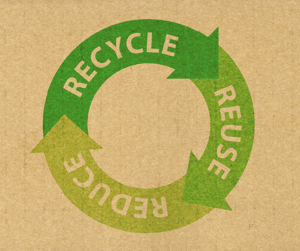The journey toward responsible waste management is not a solo act. It's a collaborative effort that requires trusted allies to guide businesses through the complexity of the process.
The need for a guiding hand becomes evident as businesses like yours grapple with hazardous materials, each with unique challenges. From the meticulous handling of industrial chemicals to the remediation of contaminated soil disposal, the landscape is rife with complexities.
This is where hazardous waste disposal companies emerge as indispensable partners, offering the expertise you need to navigate the regulatory maze and gain insights into tailoring the best hazardous waste disposal methods for your business.
Hazardous Waste Disposal Methods
Hazardous waste is any material that poses a threat to human health or the environment due to its chemical, physical, or biological characteristics. Common examples include industrial chemicals, solvents, paints, batteries, and electronic waste.
Reduce and Reuse
An important step in sustainable hazardous waste management is to minimize its generation. Businesses can implement strategies to reduce the use of hazardous materials in their operations and therefore reduce the need for disposal.
implement strategies to reduce the use of hazardous materials in their operations and therefore reduce the need for disposal.
This may involve adopting alternative, less toxic substances or implementing process modifications to generate less waste. Reusing materials like electronic waste within the company or donating them to organizations that can use them can significantly reduce the overall volume of hazardous waste.
Recycling
Recycling hazardous waste is a key element of waste management. Many materials, such as certain types of batteries, electronics and chemicals, can be recycled. Implementing a comprehensive recycling program ensures that these types of waste are diverted from landfills and are repurposed for new products.
Businesses should collaborate with reputable hazardous waste disposal companies and certified recycling facilities to ensure the proper handling and disposal of recyclable hazardous materials.
Treatment and Neutralization
There are different methods and techniques used to treat or neutralize contaminated materials, depending on what is contaminated and the level of contamination. Some common techniques include:
- Physical methods: These involve physically removing the contaminated substance or pollutants from the site. Excavation, dredging and soil washing are examples of physical methods.
- Chemical methods: Chemical techniques involve using chemicals or reagents to neutralize or break down contaminants. This can include techniques like chemical oxidation, precipitation or stabilization.
- Biological methods: Particularly in soil contamination, biological treatment remediation methods use microorganisms, plants or other biological agents to degrade or remove contaminants. Bioremediation and phytoremediation are examples of biological techniques.
- Thermal methods: Thermal methods use heat to either volatilize contaminants or to enhance biological or chemical processes that break down pollutants. Thermal desorption and incineration are examples.
- Containment: Sometimes, rather than removing contaminants, the approach involves containing them to prevent further spread. This can involve strategies like capping or sealing the contaminated area.
For waste that cannot be recycled, treated or avoided, secure landfills provide another containment solution. These landfills are engineered to prevent the migration of hazardous substances into the surrounding environment.
Businesses must work with licensed disposal facilities that adhere to environmental regulations, ensuring that hazardous waste is securely contained and monitored to prevent any adverse effects on soil, water or air quality.
Hazardous Waste Disposal Help
The best hazardous waste disposal companies play a crucial role in assisting your business with disposal methods. Here’s how these companies can help:
Here’s how these companies can help:
- Expert Guidance and Consultation: Hazardous waste disposal companies employ experts who are well-versed in environmental regulations and waste management practices. They can provide businesses with valuable guidance on reducing waste generation, implementing recycling programs and adopting environmentally friendly practices.
- Waste Audits and Assessments: Reputable disposal companies will conduct thorough waste audits and assessments for businesses. These may come in the form of a hazardous waste walk-through. These audits help identify the types and quantities of hazardous waste generated, allowing companies to tailor their disposal methods accordingly. The insights gained from these audits enable businesses like yours to make informed decisions about waste reduction and management strategies.
- Customized Waste Management Plans: The best hazardous waste disposal companies work closely with businesses to develop customized waste management plans. These plans take into account your specific needs and challenges, outlining strategies for waste reduction, recycling, treatment and compliant disposal. Tailored plans ensure that your business can address your unique waste management requirements effectively.
- Established Relationships: Hazardous waste disposal companies often have established relationships with treatment, storage and disposal facilities (TSDFs) and technologies. They can assist businesses in treating hazardous waste through processes like neutralization or incineration. By leveraging these treatment methods, businesses can reduce the toxicity of their waste, making it safer for disposal or recycling.
- Secure Landfill Services: In cases where landfill disposal is necessary, hazardous waste disposal companies can facilitate the proper disposal in secure landfills. They work with licensed facilities that adhere to strict environmental regulations, ensuring that hazardous waste is securely contained and monitored. This helps prevent any adverse environmental impacts, safeguarding soil, water and air quality.
- Regulatory Compliance Assistance: Staying compliant with environmental regulations is a complex task. Hazardous waste disposal companies stay abreast of changing regulations and assist businesses in ensuring compliance. This includes helping your business understand and adhere to land disposal restrictions, documentation requirements and reporting obligations.
- Continuous Monitoring and Reporting: The best disposal companies provide continuous monitoring and reporting services. This involves tracking the disposal process and ensuring that all waste is managed according to regulatory standards. Regular reporting helps your business demonstrate your commitment to environmental responsibility and transparency.
- Training and Education Programs: Disposal companies may offer training and education programs for employees to facilitate a culture of responsible waste management. These programs help workers understand the importance of proper waste disposal, recycling practices and compliance with regulations.
- Emergency Response Services: In the event of spills or emergencies, hazardous waste disposal companies offer prompt response services. Their expertise in handling hazardous materials ensures that incidents are managed effectively, minimizing environmental impact and potential harm to human health.
By partnering with the best hazardous waste disposal companies, businesses can benefit from comprehensive support, ensuring that their waste management practices align with sustainability goals and regulatory requirements. This collaboration not only promotes environmental stewardship but also contributes to a more sustainable future - both environmentally and economically.


Comment